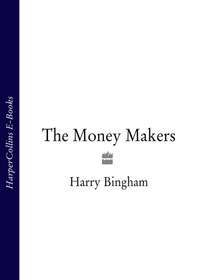
Полная версия
Sweet Talking Money
Cameron left to go into the kitchen, and Bryn turned to stare directly at Larousse.
‘OK. First question. Did you and Cameron cheat on that experiment? In any way at all? At any time?’
Colour rose in the young scientist’s face. ‘No. Absolutely not. Never. No way.’
‘OK. Good. I believe you, but I needed to ask. Second question. Your Immune Reprogramming worked on rats. Are you sure you can get it to work on humans? I mean, assuming you’ve got time and money.’
Larousse wetted her lips. It was unnerving, this giant man, his unwavering stare, his barely controlled intensity. ‘Not certain, no. Nothing in science is certain until you’ve done it. And one critical difference is that the peptide chains we rely on are species- and disease-specific.’
Bryn looked blank.
‘What I mean is, our Reprogramming works by using little bits of chemical code, which literally floats around the body instructing it how to fight disease. Trouble is, every species has got its own way of coding these things. That means all the work we’ve done on rats has to be done over with humans.’
‘So the answer is?’ prompted Bryn.
Larousse shrugged. ‘It’ll be a lot of work. The experimental protocols will be way more complex, for one thing. You can’t just give hepatitis to humans and see how they do. But I don’t want to be too cautious. I’d say we had every chance of success. Every chance in the world.’
Bryn nodded. It seemed like he hadn’t blinked since sending Cameron from the room. ‘Good. Third question. The way Cameron talks, you and she are on the cutting edge of research in this area. How do you know? Maybe there are scientists in, I don’t know, California, Germany, Japan who are ahead of you.’
‘Possible. That’s always possible. All I can say is, we’ve never heard anything of the sort. There are others in the field, of course, but no one even approaching our level of success. And then, of course …’
‘Of course?’
‘There’s Cameron. She’s not just good, you know. She’s extraordinary. Passed out in the top two per cent of every exam she’s ever taken. She got bored during her Harvard medical training – would you believe that? She got bored – and did a PhD in biochemistry at the same time. The same time. Without even telling them. It’s unbelievable. She’s not just good, she’s the best.’
Bryn breathed out and sat back. The glare left his eyes, and Larousse began to relax. Cameron, peering round the corner from the kitchen, re-entered the room.
‘A fourth question,’ said Larousse. ‘You said you had four questions.’
‘Right, you’re quite right. Kati, do you know anywhere round here we can get some pizza?’
2
Despite the hour, the pizza restaurant was busy. It was as though, all across the city, the snow pattering down outside had stimulated people to go out into the whitening streets in search of food. They took seats in the window, and watched cars glide by them in silence across the dim, phosphorescent snow. Kati had just pulled warm clothes over her nightwear, and the flannel collar of her pyjama top poked upwards out of her jumper.
The two women claimed not to be hungry, and agreed to share a no-cheese, no-flavour, thin crust Marinara, while Bryn ordered a fourteen-inch Massachusetts Gobbler Special and a pitcher of beer. The two scientists sat together, wondering why they were here, wondering about Bryn.
He wolfed the first slice of pizza and downed a long draught of beer. ‘That’s better,’ he said with a belch. ‘Cameron, you ought to be famished. No? OK. You want to know what on earth is happening. More to the point, you want to know what the bloody hell I’m doing here.’
Kati nodded, and Cameron looked alert.
‘First the bad news. Brent Huizinga and Corinth Laboratories have sabotaged your research. They’ve done it once. They’ll do it again. They’ll go on doing it until they’ve driven you from the scene.’ Bryn gestured broadly with a wedge of the Massachusetts Gobbler. Dollops of ground beef and chilli dropped off on to the melamine table. He took another bite, and with his mouth full asked, ‘That night you found Kovacs in your laboratory, you know what he was doing?’
Cameron shook her head.
‘He was planning to screw up your experiment. Kill off your rats, or whatever. Don’t know, doesn’t matter. Wherever you go, whatever you do, Huizinga is after you. He’s got a hundred billion dollars to protect, so even if it costs him a few million bucks to do it, he’s going to silence you.’ He prodded at her with his lump of pizza. ‘This time. Next time. The time after that and the time after that.’
The colour – what little colour there was – emptied from Cameron’s face in less than a second.
‘How dare you –’ began Kati, but Cameron interrupted her with a gesture.
‘It’s not true what you say,’ she said icily. ‘From here, our next step is human research. Nobody’s going to believe that we fake results there. Every single patient we work with will be able to corroborate us.’
‘Yes.’ Bryn took another vast bite. ‘And how much will it cost, the next phase?’
‘Five million bucks, maybe ten,’ said Cameron.
‘And who’s paying?’
‘Anyone,’ said Cameron, ‘anyone at all.’ She tore a crust off her pizza and rolled it into a ball, rolling it round and round her palms like a six-year-old with Plasticine.
‘As far as the world believes, you did some experiments with rats which failed. You faked the results, wrote them up, and had your paper rejected. That’s not worth five million bucks. That’s not worth anything at all.’
‘For God’s sakes,’ said Kati to Cameron, ‘we don’t need to sit and listen to this.’ But once again, Cameron motioned her silent. This was a duel she had to fight.
‘So who?’ said Bryn. ‘Who’s going to fund you?’
‘OK,’ she whispered. ‘It’ll be tough. Either the people funding me at the moment will go on doing it, or else I’ll need to repeat my animal work using independent labs and outside experimenters. That way, no one can possibly accuse me of cheating.’
‘To repeat your animal work elsewhere you need money, which you don’t have. And Huizinga can infiltrate outside labs even more easily than he can get into your own. Wherever you go, whatever you do, he’ll make sure he finds a Duaine Kovacs to foul up your experiments. No one will need to accuse you of cheating, because your tests will fail.’
Cameron’s voice had shrunk away to nothing. It was the ghost of a whisper, the echo of a croak. ‘Then the people who are funding me now, the biotech crowd, will go on. They’ll believe me, not Kovacs.’
‘Cameron, I know for a certain fact that your funding is about to be cut off.’
Her voice had vanished, but her eyes asked how.
‘Go easy,’ warned Kati. ‘Take care.’ But Bryn ignored and overrode her.
‘I know, because I’m working for the buyers, remember? I’ve worked on their acquisition plans. I’ve sat in on their strategy meetings. They’re going to cut you off.’
‘That’s not what they … Every decision … its own merits.’ Her voice faded in and out of audibility.
Bryn bashed away one last time. The family motto: if at first you don’t succeed, thump it. ‘Of course they say that. They want to close the deal. They’ll say anything. I tell you, I know their plans. They’re doing the whole deal for one drug, Biloxifan. They’re going to sell a couple of the other drugs in development. They’re going to relocate some research staff. Then –’ He snapped his fingers. ‘They’ll fire everyone else, sell the buildings. I know, Cameron, I know. I’m their banker.’
‘It was your idea, wasn’t it?’ said Kati, eyeing him sharply. ‘You told them what to do and they’re doing it.’
Bryn denied nothing. ‘I advised them in their commercial best interest. It’s my job. When I advised them, I hadn’t met Cameron and I hadn’t met you.’
‘I’m finished,’ said Cameron. ‘You’re quite right. Thanks to you, I’m totally finished.’
Her voice began to turn into a yell, and from round the restaurant people began to stare.
‘You should be ashamed of yourself!’ said Kati furiously. ‘Don’t you think she’s suffered enough tonight without you rubbing her face in it?’
‘Rubbing her face in what?’ asked Bryn, tearing off another gigantic slice of pizza. ‘Don’t you even want the good news?’
3
And so, at a quarter past two on a snowy night in Boston, Bryn outlined his plan.
Crazy as it sounded, Bryn had made up his mind. He wouldn’t stay at Berger Scholes. He wouldn’t take the jobs his headhunter was bringing him. He’d quit. Wave goodbye to his deferred bonuses. Wave goodbye to banking, where every year is a bumper year, every bonus bigger than the last.
‘I don’t get it,’ said Cameron. ‘I see why I benefit. I get funding. I get to carry on with my science. But I don’t understand what’s in it for you?’
Bryn bent across the melamine table, pushing his pizza crusts to one side. Two o’clock Boston time was seven in the morning London time. Bryn’s time-zone-delirious body was long past caring. The brain called the shots, and the body was happy just to swallow the pizza and guzzle the beer.
‘I set up a company. The company employs the pair of you to carry out your research. I’ll fund you. I’ll give you all the support you need. In return, I get to exploit your findings. We’ll push your discoveries so hard that they’re doing your Immune Reprogramming in every hospital from Tokyo to Toronto.’
‘Exploit my findings? You mean, like, commercially exploit?’
‘Yup.’
‘Patents, and royalties, and the stockmarket, and all that stuff?’
‘Exactly.’
‘Right. OK. I get you. No.’
‘No?’
‘No. I didn’t go into medicine to make money. If you have a discovery which benefits patients, you just have to put it out there. Let people use it for themselves. Not try to make a dollar every time somebody gets sick. I’m sorry. I don’t know what I’m going to do next, but not that. No way.’
She glanced across at her neighbour, asking for support. Kati gave it. ‘I agree. What we’re doing is for the good of humanity. It’s not for sale.’
‘You’re crazy, absolutely crazy,’ he said. This was the one sort of opposition he hadn’t expected, and for a moment he was utterly unsure of how to handle it. It was like a modern astronomer trying to argue with someone who thought the world was flat, that the sun orbited the earth, that the heavens were full of angels singing. ‘You’re making a mistake,’ he said lamely.
‘I appreciate all that you’ve done –’
‘Why should you?’ asked Kati. ‘He hasn’t done anything, except cut off your funding.’
‘But I think I should go. Really.’
The two women stood up, Cameron tall, skinny and evasive; Kati, with her halo of hair and her deep-brown spaniel eyes. They were getting up to go.
‘No. Stop. You’ve got to hear me out.’ His voice had a desperate edge, and he ordered himself to master it, adding more calmly, ‘Sit down, just listen to the arguments.’
The two women looked at each other, and, taking the lead, Cameron sat, followed by Kati. But it was edge-of-the-seat sitting, nothing more than a hair’s breadth away from leaving again. Anything Bryn said would have to be good.
With a hoarse voice, he spoke. ‘In the medical world, when it comes to choosing how to care for patients, what does it come down to really, truth or money?’
Cameron took a moment to absorb the question. Then, calmly, ‘It’s truth, of course. One bunch of scientists does its best to come up with solutions. Another bunch of scientists tests them out. They publish their results. And that’s it. Doctors adapt their treatments. Patient care improves. It’s that simple. It’s got nothing to do with money, whatever you might like to think.’
‘Really?’ asked Bryn. ‘Really? Then tell me, how much money do we spend on preventing disease, as opposed to treating? Two per cent of the total? Three per cent?’
Cameron laughed, a kind of snort as though dismissing the question. ‘Well, OK, we don’t spend anything like enough on prevention, it’s true. But –’
‘But what? What’s that statistic again?’ He appealed to Kati for help. ‘If you take Vitamin E, it reduces your risk of heart disease by … by how much?’
Kati pondered the question in silence. It was as though she had the answer at her fingertips but was wondering whether to release it. After a long pause, she made her decision and spoke. ‘There was a big study done recently,’ she said with a sigh. ‘Ninety thousand patients followed over two years. All taking Vitamin E. Heart attack risk was reduced by nearly half –’
‘Half!’ said Bryn.
‘But other studies have been done using bigger doses of the vitamin. Those studies suggest the real figure is more like three quarters.’
‘Exactly,’ said Bryn. ‘So there you go. If we wanted to, tomorrow, we could cut heart attack deaths by three quarters. Three quarters. With one simple little vitamin. So how come we don’t? How come people still die needlessly? Hundreds of thousands, every year. What’s stopping us?’
His question was greeted by silence. Pizza crust cooled on the melamine table, but at least up above, in the glassy heavens, the angels had stopped their singing. Cameron licked her lips which had gone dry. She was listening.
‘I’ll tell you how come,’ he continued. ‘There’s no damn money in it. Vitamins aren’t patented. Anyone can make ’em. The profit margins are no better than you get from selling potatoes. But – surprise, surprise – drugs aren’t like that. Profit margins can be ninety per cent or better. You know that. Annual revenues in the US cancer trade are a hundred billion dollars. Each year, every year. The heart disease business comes a good second. Who cares that we can prevent most of that disease? Who cares if people die? Why should some bloody little vitamin salesman be allowed to poop that party?’
The silence continued. Bryn wondered if he’d done enough, or gone too far. It was Kati who spoke next, and when she spoke, Bryn realised she’d become an ally.
‘It’s true. And it’s not just drugs. It’s surgery. It’s been estimated that eighty per cent of heart bypass operations are unnecessary, arguably nearly all of them.’
‘Right,’ agreed Bryn. ‘Absolutely right.’
‘And then there are the drugs which actually do you harm,’ continued Kati. ‘Cholesterol-lowering drugs which give you cancer. AIDS drugs that have been shown to shorten your life. Chemotherapy drugs which shrink tumours but have no impact whatsoever on life extension, though the doctors never tell you that.’
Cameron was very pale, and Kati too stopped, wondering if she’d pushed things too far. But again, when Cameron managed to find words, they were words of support. ‘Arthritis,’ she whispered. ‘My grandmom suffered really badly from arthritis. I was real mad when I found out in med school that standard drug treatment actually makes the illness worse.’
‘Exactly. My granddad, too. Good example,’ Bryn encouraged her.
‘Best-practice treatment of arthritis,’ said Cameron, ‘would be diet, plus allergy interventions, plus maybe some natural cartilage-builders.’
‘Right.’
‘But no drugs.’
‘Nope.’
‘So no profits from drugs.’
Silence.
‘Anti-depressants,’ said Kati sadly, after a while. ‘The best ones are all non-pharmaceutical, but no one uses them.’
Bryn nodded in agreement. ‘No one.’
‘No money in them, right?’
‘None at all.’
Silence.
Cameron looked out at the snow. As they had been speaking, a soft blanket had fallen, muffling the city. People and cars, when they appeared at all, moved slowly, treading cautiously, slowing right down at the bends. Then she brought her gaze back into the room, first down at her hands, then up, sadly, very sadly, to Bryn’s face. The white tabletop reflected chilly light on to the underside of her face, as though she too was wandering outside, lost in the moonlight and the snow.
‘Well, I guess this has been my night of lost illusions.’
‘It must be hard.’
‘You always do this when you invite a girl out to dinner?’
He smiled. ‘I’m sorry.’
‘So tell me again. What you want us to do.’
Bryn repeated his ideas, going slowly, making sure he brought Cameron along with him this time. ‘I’ll set up a company which will help you to develop your research, and then market it when it’s ready. You say you hate the way Corinth does business. OK. So put them out of business. Not by publishing research papers. Who’s ever heard of a corporation going under because of some damn research paper? Hit ’em where it hurts: their bottom line. We’ll pitch our salesmen against their salesmen, our results against theirs.’ He put his hand on Cameron’s arm and said very gently, ‘It sounds mad, I know, but the stockmarket is your friend. You fight them in the laboratory, and I’ll fight them in the marketplace. If we get it right, the whole world will be reprogramming its immune system and nobody, but nobody, is going to be popping Corinth’s little poison pills.’
The scientist paused. ‘Why are you doing this? You want to save the world? Or do you just want to make your million?’
‘Make a million?’ Bryn smiled sympathetically. ‘No. I’d like to get rich, seriously rich, a hundred million rich. If I do a little good along the way, then that’s great. But I don’t pretend that I’m doing this for the good of my soul.’
‘Uh. Well, that’s clear enough, anyway.’
The world fell silent as Cameron thought. This was the biggest decision of her life, the hardest, the most painful. But also, as she thought about it, the easiest. Her reputation was gone, her funding, her hopes of scientific acclaim. Her only hope was sitting in front of her, a battered-looking steamroller of a man, someone she scarcely knew.
‘OK,’ she said. ‘You win. I give up. Let’s do it.’
4
The U-Haul depot opened at dawn and Bryn was first in line. He was about to sign out a mini-van, but Cameron shook her head. ‘Too small,’ she said. So Bryn hired a truck and bought a hundred and twenty orange crates at five bucks each.
‘You an experienced driver?’ asked the boiler-suited rental guy. ‘Them streets outside are an inch of snow laying atop of an inch of ice.’
‘Finalist in the Welsh all-terrain truck-drivers’ championship,’ said Bryn. ‘Would’ve won ’cept some bastard shunted me.’
‘You don’t say?’ The rental guy took a different set of keys from the board behind him. ‘Here, take the Toyota. Transmission on the Volvo is shot to shreds. Same price. Don’t mention it. Finalist, huh?’
It was a good job the rental guy chose to stay reading his Off-Road Biker inside his oppressively warm glass booth, else he’d have seen Bryn slide twice coming out on to the road and only miss a negligence suit by the fewest of inches as an outraged motorist swerved angrily away from the outcoming truck.
‘You even know how to drive?’ said Cameron.
‘I’m a quick learner.’
Once in Cameron’s office, they worked fast, with Cameron’s spirits rising rapidly as her sense of adventure took hold.
‘Kati?’ she said.
‘Uh-huh?’ Kati shifted a stack of paper into a crate and stood up, flexing her back.
‘Our new colleague, Bryn. Part crazy, wouldn’t you say?’
‘You’ve found a part that’s sane?’
‘Paranoiac, for sure, and what do you think? A little hypomanic, could be?’
‘Uh, I guess. Mental health. Not my field.’
Bryn said nothing, just worked to clear the office as fast as he could. He’d filled sixteen crates and already his back was beginning to sing out warnings.
‘Bryn?’ said Cameron.
‘Yes?’
‘There are some pretty good drugs these days. I could put you on something.’
‘Lithium,’ said Kati. ‘Have you thought about lithium?’ ‘Yeah, good, start you on lithium, maybe? Or you want me to refer you to a specialist?’
Bryn dropped the crate that he was holding.
‘Your ethics committee.’ he said. ‘The one that was going to investigate you. Have you ever heard of it in your life before?’
‘I’ve never been framed in my life before,’
‘They wanted you to collect up all your research data, protocols, everything.’
‘Just like a committee, wouldn’t you say?’
‘Then hand it to them.’
‘Not much point collecting it otherwise.’
‘Corinth. Not an ethics committee. Corinth. Fantastic idea. They just ask you to collect everything significant from your last five years of research and hand it over to them. Perfect. That’s why we need to clear out tonight. Make bloody sure that they get nothing, nothing at all.’
Cameron paused. Then, ‘Not just paranoia, Kati. Schizophrenoform psychosis. Florid stage. Lithium, for sure. But I’d have to think about chlorpromazine. Maybe clozapine, risperidone.’
‘You think I’m nuts,’ said Bryn. ‘You find me any reference to that ethics committee, anywhere, ever.’
‘Kovacs had the run of this office and my lab,’ said Cameron. ‘If they wanted stuff, they could have just taken it,’
‘For God’s sake, woman,’ said Bryn, more impatiently than he’d intended. ‘Have you ever actually opened your eyes in here? Look at this place.’
Even after twenty-four crates of paper had been cleared and stacked, the room was still overflowing with paper. Cardboard trays of collection bottles sat on top of computer keyboards which rested on paper foothills that led up to the mountains all around. The four anglepoise lamps sat like herons pecking nourishment from the sea of clutter. Cameron looked around.
‘It’s kind of … crowded, I guess.’
They worked on for a while in silence. It was back-breaking labour, and one by one the two women, short of sleep and short of food, dropped out, leaving Bryn to finish. His own back complained angrily now, and his dodgy knee had twisted badly on the icy pavement outside. At length, with the office empty but for the computer hardware, the anglepoise lamps, the bare workbenches, and the sheets of chipboard idle on their concrete blocks, Bryn stopped. Cameron had collapsed with exhaustion and delayed-onset shock and was snoring away on one of the chipboard sheets, covered up with Bryn’s greatcoat.
‘OK, then. One at a time,’ said Bryn, beginning to load the PCs into crates.
Kati hesitated, instead of helping him. ‘Technically –’ she began.
‘I know. Technically, these PCs belong to the biotech crowd, not you. But then technically, as an employee of Berger Scholes, I shouldn’t be doing what I’m doing. And technically, Brent Huizinga didn’t do anything criminal by destroying your reputation and sabotaging your work.’
He yanked out the power cords and Kati, silently and solemnly, helped him to steal them.
5
The final stage was the laboratory. Kati took a quick inventory of the place where she’d spent so many hours.
‘This PC,’ she said. ‘And this.’
She placed her hand on a domed chamber about four feet in diameter. It was built of white metal, had a control panel at the side, and a number of leads connecting it to the computer.
‘And this would be … ?’
‘The correct term for this would be the White Blood Cell Immune Modulation and Reprogramming Facility.’ Kati stroked the domed surface with affectionate familiarity. ‘But since it’s where blood cells come to learn how to be better blood cells, we usually just call it the Schoolroom.’
Watched anxiously by Kati every step of the way, Bryn hefted the Schoolroom to the truck.
‘No, not on the crates. It needs cushioning. Don’t just drop it. Gently. There.’








